If you are interested in working in the global health arena, then having experience living, volunteering, or working abroad is key to getting your foot in the door. Even if you are thinking of studying global health in a master’s or doctoral program, it is important to supplement your knowledge with relevant, practical, and hands-on field experiences to be better prepared as a global health practitioner.
The Sustaining Technical and Analytic Resources (STAR) Communications team invited Intern Stephanie Mork to share how her experiences living and working in Nicaragua prepared her to study global health in graduate school, and how it has set a foundation for her career planning. Note: The following conversation has been edited for brevity and clarity.
Most STAR participants – Fellows and Interns – and students in health academic programs are interested in volunteering or working abroad at some point in their careers. When and how did you become interested in working abroad? How did you find and land your opportunity?
Studying global health first came into my line of sight while I was studying abroad at University College Cork in Ireland, through the College of Saint Benedict in Minnesota. I took a course called Human Nutrition in the Developing World, not really realizing what it was because it was the only nutrition class that I was eligible for as an international student. As fate would have it, I loved the class and it was the fuel for my final project on Vitamin A deficiency for my undergraduate degree in nutrition and dietetics.
The whole world of global health fascinated me and stuck in the back of my mind while my plans of becoming a dietitian fell by the wayside. I spent the next two years after graduating from college working a series of jobs that had nothing to do with nutrition or global health. I traveled to Italy for three months, worked as a canoe instructor and program administrator at an adventure camp, and worked as a communications coordinator at a nonprofit until I decided to enroll in graduate school for my Master of Public Health.
I discovered Eat United Nicaragua, the organization in Nicaragua I worked for, by sheer luck during a lengthy Google search on nutrition-related NGOs in Latin America. Eat United Nicaragua is focused on reducing food waste and increasing food security by collecting unsold, unwanted produce from vendors in the biggest market in Managua and redistributing it to communities in the city that had a need for it.
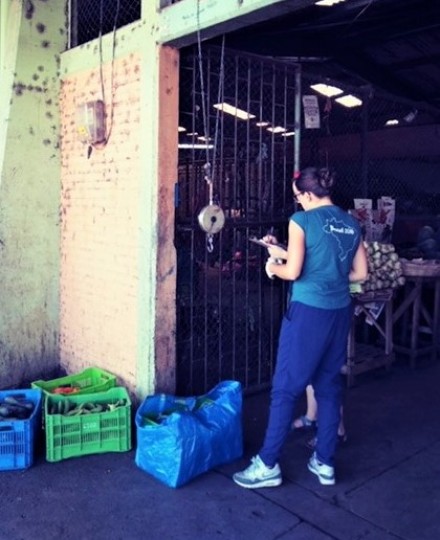
A volunteer working at Eat United Nicaragua
I applied to be a communications intern, had a Skype interview, and shortly after, booked my flight with plans to return before my master’s program started!
What were the biggest challenges of working abroad?
The language barrier was one of the most challenging things about working and living in another country. Additionally, I would say that aside from the uncertainty of what was going on half of the time, it would be the physical challenges of living in such a different environment. Nicaragua is hot and loud; markets and buses are crowded and overwhelming; and travelers are not common in Nicaragua, making me stick out like a sore thumb as a Caucasian blonde female. City buses were rarely ever on time and often, there was only standing room on the buses.
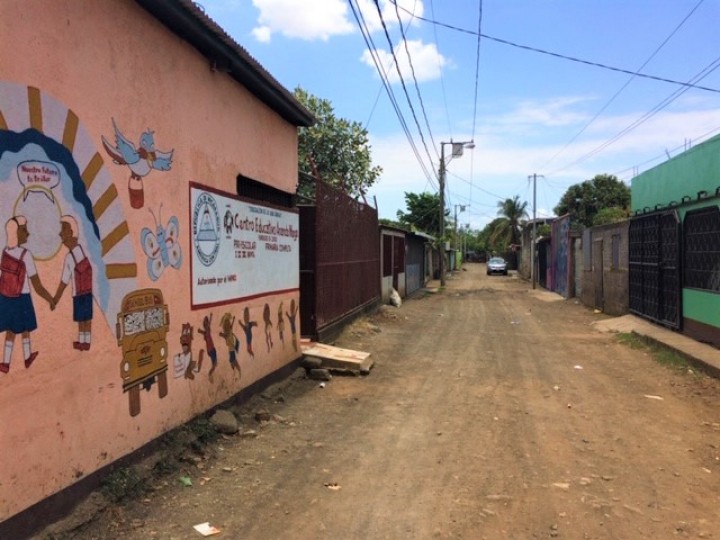
A street in the barrio
Prior to moving to Nicaragua, I was accustomed to living in a house that had a large kitchen with ample fridge space, where I could come and go freely. In Nicaragua, I lived in a home with six adults and one baby where we all shared one bathroom, and most of the fridge space was reserved for ingredients for the families’ juice-making business. My host mother held the only key to the house, so I needed to plan my days around making sure that someone was home to unlock the gate and let me in. Like many other countries, Nicaragua has a water shortage, and in the barrio [neighborhood] that I was living in, the taps were only turned on from about noon to 10 p.m.
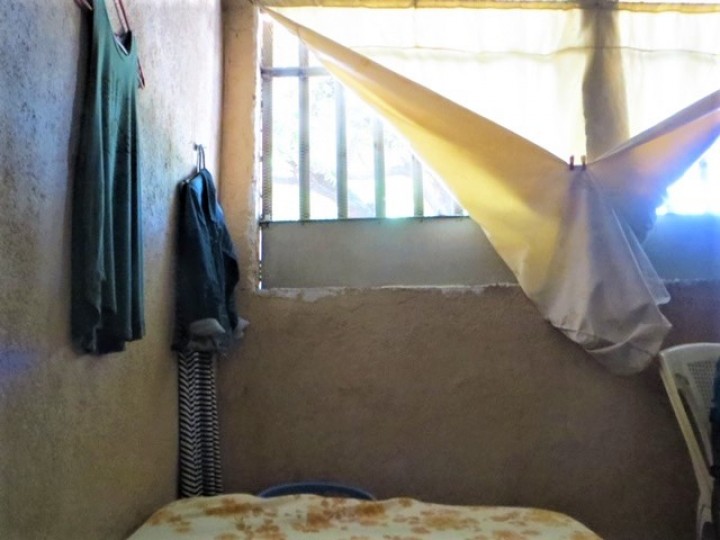
Stephanie Mork’s living quarters in Nicaragua
With a line to use the toilet on most days and no running water for half of the day, as well as no English speakers in the house, I needed to adjust to living in that home very quickly.
What were some cultural differences that you had to adjust to? What were some customs and traditions in your host country that you weren’t accustomed to? Were there any that you especially liked?
Nicaragua is very hot, like the kind of hot where you sweat the moment you wake up until the moment you go to sleep – and maybe also while you sleep! Because of the heat, people rose before the sun came up to go about their business before the heat of the day struck. I am not an early riser, but quickly understood that if I wanted to be awake without sweating profusely, I would have to adapt to rising early.
Regarding Nicaraguan cuisine, I learned about certain foods and customs that I was previously unfamiliar with: drinking juice out of a plastic bag, rice and beans (“gallo pinto”) and fried plantains, fresh corn tortillas, fresh pineapple, mango, and other exotic fruits I had never heard of.
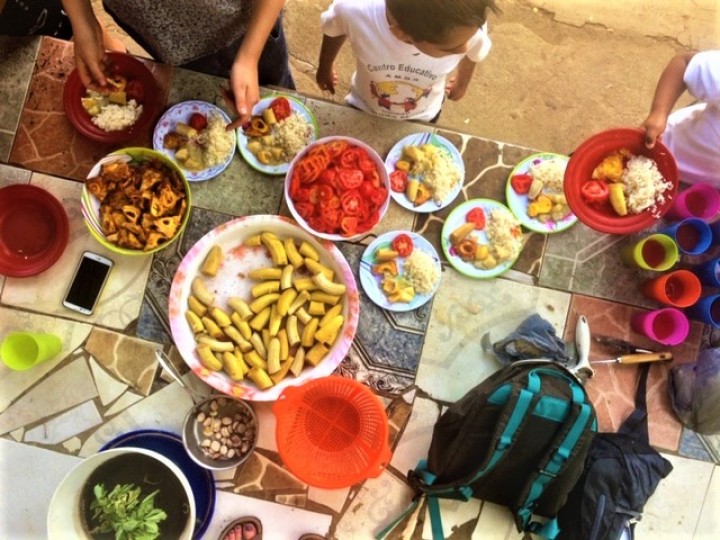
Gallo pinto, plantains, and exotic fruits are staples of Nicaraguan cuisine
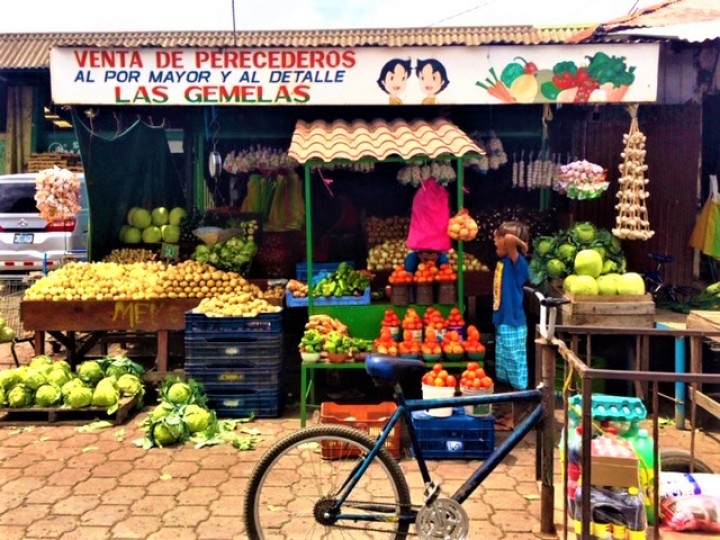
A feast for the eyes, a treat for the taste buds: the local market sells exotic fruits like mangoes, papayas, pineapples, and more
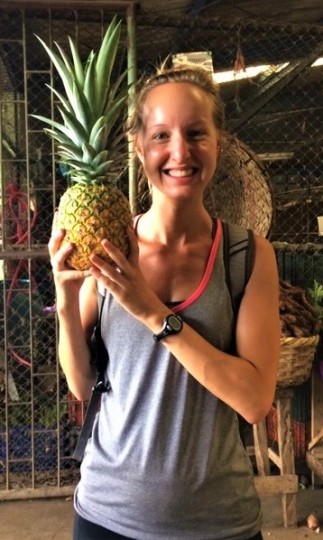
Stephanie holding a huge pineapple!
I have fond memories of sitting on the sidewalk in front of my house and being handed a fresh sugary fruit drink my host mom concocted, and stumbling through Spanish conversations with the neighbors and members of the household. Aromas from the neighbors’ sidewalk food stand would waft over, and stray dogs would be running around in the street. Nicaraguans work very hard to make their way, and their way of life was simpler and slower than what I was used to, which I didn’t mind at all.
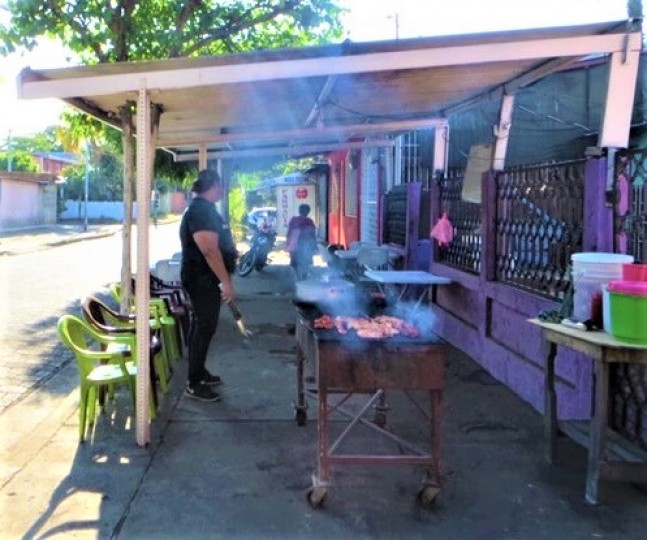
Local food stands concocting delicious and aromatic foods
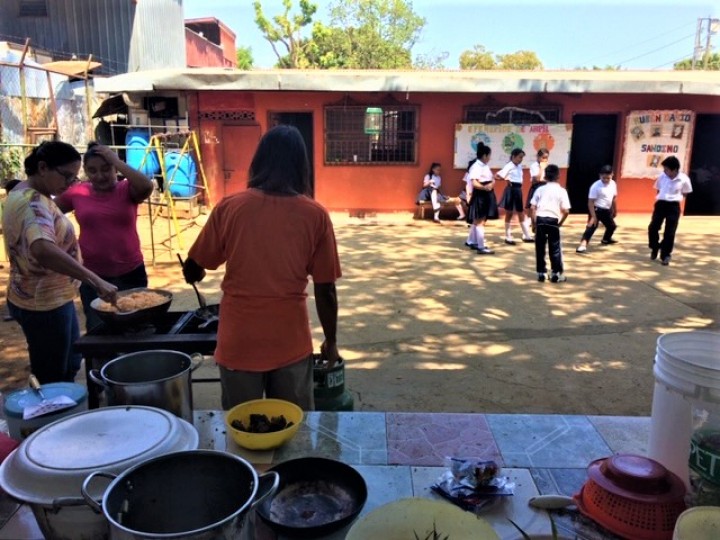
Cooking in the barrio while schoolchildren play outside
What were the greatest rewards of working abroad?
There were so many rewards [from this experience]. My internship was focused on communications, so I wrote blogs, took photos, created social media content, etc., and gained a lot of skills in equitable storytelling.
I also participated in food collection and distribution alongside local Nicaraguans who comprised the bulk of the organization’s volunteers. From this experience, I gained valuable insight into how sustainable programs [in Nicaragua] are almost always run by locals who are passionate about the cause and have a better understanding of resources and needs.
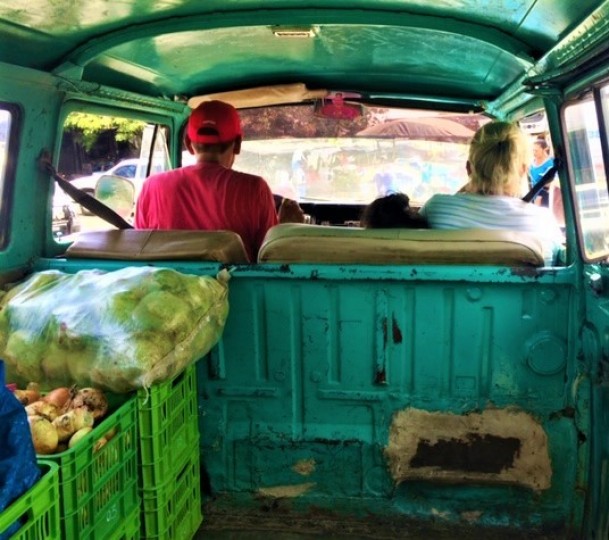
Volunteers distributing food through Eat United Nicaragua
The rewards of working in Nicaragua include professional growth and development of both technical and “soft” skills, and the greatest rewards were the relationships formed, personal growth, and life lessons learned.
What advice would you give to others who are thinking of working abroad, and how should they prepare beforehand?
Making the decision to work abroad, however long it is going to be, deserves some thought. For example, do you know the local language? Where will you live? Will you cook for yourself? Will you be spending a lot of time alone? Have you traveled internationally before? These are all important questions to ask as working abroad can definitely have its benefits, but it is not always easy.
Depending on the location, it might be difficult to make friends or do extracurricular activities because of safety or language barriers. Be prepared to think about the realities of actually living abroad and not just working in another country. There will be an adjustment period regardless of where you go or what you do, but some locations may be more challenging than others.
Before arriving in country, try to learn a little bit about the country, its history, and your colleagues’ backgrounds before you go. Context is everything, and there may be political or other constraints holding an organization back from taking certain actions to further its pursuits.
Always go in with the mindset of a learner. Regardless of where you are in your academic pursuits, having the attitude of being there to learn and assist rather than to take charge will go a long way in developing positive and healthy working partnerships and relationships.
We would like to thank Stephanie for sharing her experiences and insights from living and working abroad. If you are interested in working or living overseas, keep in mind that each experience will come with its own set of rewards and challenges. But if you prepare beforehand, keep an open mind, and have a learner’s mindset, you’ll be ready for the journey ahead – and an experience of a lifetime!
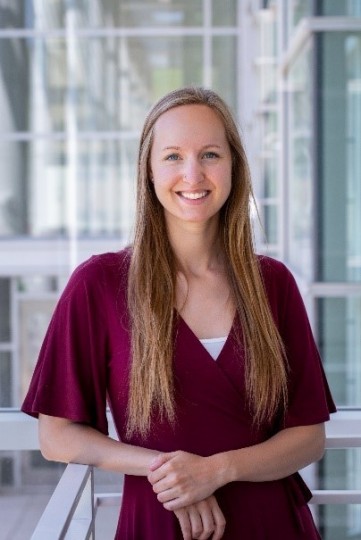
Stephanie Mork
STAR Nutrition Intern in USAID’s Global Health Bureau, Office of Maternal/Child Health and Nutrition, Division of Nutrition and Environmental Health